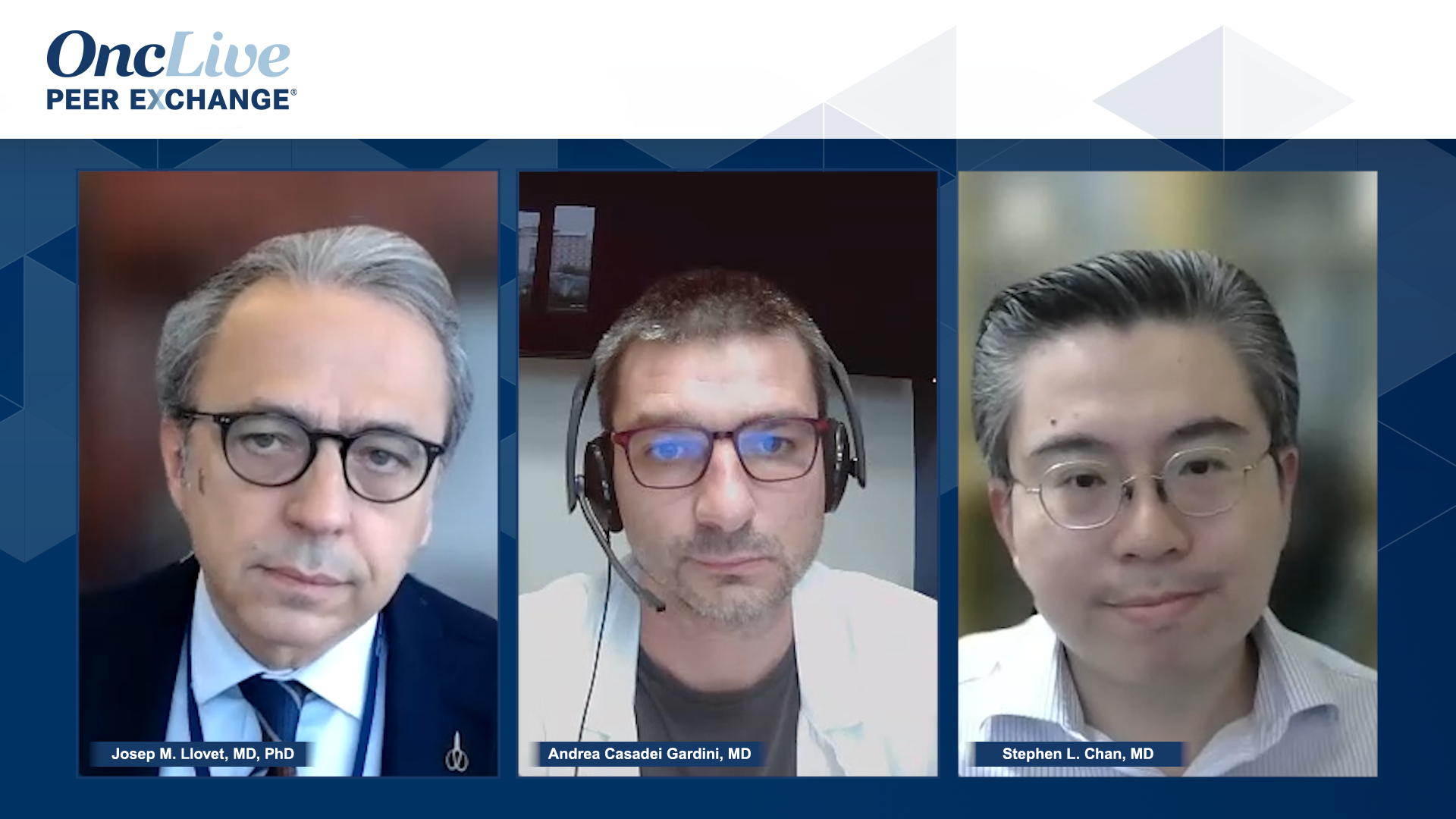- Advertise
- About OncLive
- Editorial Board
- MJH Life Sciences brands
- Contact Us
- Privacy
- Terms & Conditions
- Do Not Sell My Information
2 Clarke Drive
Suite 100
Cranbury, NJ 08512
© 2025 MJH Life Sciences™ and OncLive - Clinical Oncology News, Cancer Expert Insights. All rights reserved.
Updates to First-line Treatment Options for Advanced HCC
Andrea Casadei Gardini, MD, presents the case of a 63-year-old man diagnosed with advanced HCC, and the panel reviews available first-line treatment options for patients with advanced HCC.
Josep M. Llovet, MD, PhD: Let’s move to model 2, which is about the first-line systemic therapy for advanced HCC [hepatocellular carcinoma], and I would like to hear about the case from Dr Casadei.
Andrea Casadei Gardini, MD: I will present a case of a 63-year-old male with chronic hepatitis B, who recently started antiviral therapy. He presented with nausea and abdominal pain, and a blood examination highlighted a count of 63,000 platelets, 9000 [ng/mL] alpha-fetoprotein, 1.2 [mg/dL] bilirubin, 3.9 [g/dL] albumin, transaminases of 76 [U/L], and alanine aminotransferase of 122 [U/L]. The DNA hepatitis B is lower, it is 12. The patient’s CT scan showed evidence of multifocal infiltrate liver lesion and segmental portal vein invasion in the right lobe. The patient was diagnosed with advanced hepatocellular carcinoma with good liver function, Child-Pugh A score, ECOG performance status of 1.
Josep M. Llovet, MD, PhD: We have a classic case of advanced HCC with vascular invasion and ECOG performance status of 1, but still with all the characteristics of liver function and performance status in those who receive any type of systemic therapy. We need to discuss a few things, first, what is the first option for this patient? According to our guidelines, that would be atezolizumab plus bevacizumab. We must understand the status of esophageal varices or gastric varices at endoscopy, which are not mentioned. We can assume that most Child-Pugh A patients do not have at risk varices. So by default, the question is would your first treatment option be atezolizumab, bevacizumab? Imagine that it’s atezolizumab, bevacizumab, you need to justify why. Then in what cases do you think there are contraindications for atezolizumab, bevacizumab, where you will use a single-agent TKI [tyrosine kinase inhibitors] like sorafenib or lenvatinib?
Stephen L. Chan, MD: For this patient with BCLC [Barcelona Clinic Liver Cancer] stage C disease, still with preserved hepatic function, I will follow the guideline and the phase 3 data now, the IMbrave150 data. The standard still is atezolizumab and bevacizumab. We need to have an endoscopy for this patient because the…is a bit low, this patient may have chronic portal hypertension and also untreated varices. Yes, atezolizumab and bevacizumab, but in some cases I may consider the TKI, especially lenvatinib. For example, if the patient had history of a transplant, but not applicable to this patient, or patients with poorly controlled or severe autoimmune disease. These pose contraindication to the anti–PD-1 or ICI [immune checkpoint inhibitor] treatment. Another point is sometimes I see patients who are less fit and with aggressive disease from their history. It takes time to arrange the endoscopy, so if I want to start treatment today or tomorrow, I may start with lenvatinib. We still see a number of patients with response among this group of patients, so this is my first-line choice.
Josep M. Llovet, MD, PhD: When you’re checking the story of this patient, the platelet count is 63,000. Generally this reflects portal hypertension, so an endoscopy would be required prior to starting the therapy. We were discussing contraindications. We have high-risk varices, particularly associated with the risk of bleeding with bevacizumab, so this would be a contraindication if they are untreated. Another contraindication would be patients who have been treated with a liver transplantation for the primary tumor, due to potential graft rejection. Another contraindication is autoimmune disease, and these situations all lead to choosing lenvatinib or sorafenib, in the front line.
Transcript Edited for Clarity


